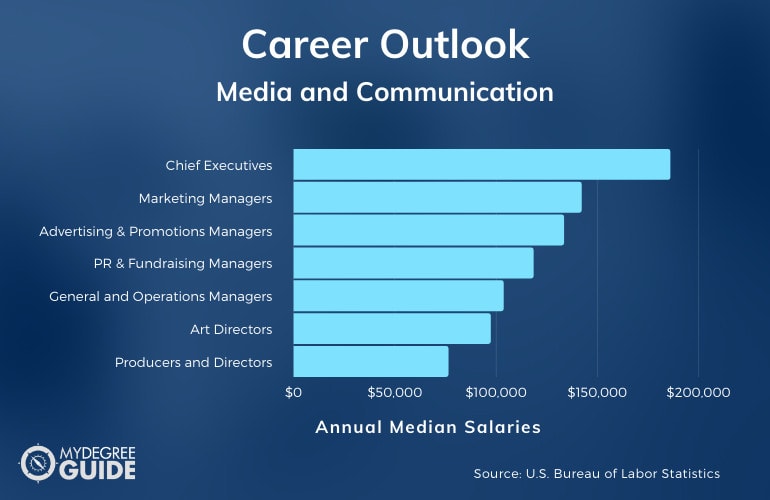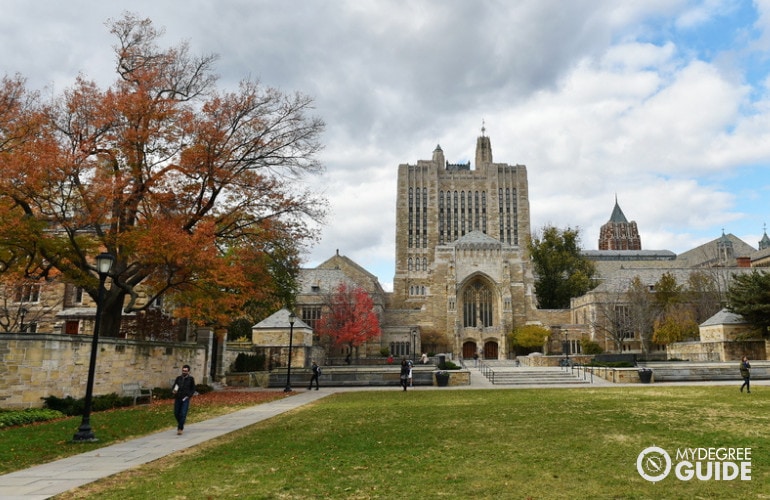If you’re fascinated by the relationship between people and the media that surrounds us, a PhD in Media Studies might be an advantageous path for you to explore.

Those who earn a PhD in Media Studies have a unique opportunity to conduct further research into how media and media consumption impact us culturally, socially, and emotionally—and vice versa.
Editorial Listing ShortCode:
From content to creation, those who pursue a doctorate in media studies learn how to analyze, interpret, and research the many types of media and how people connect with them.
Universities Offering Online PhD in Media Studies Degree Program
Methodology: The following school list is in alphabetical order. To be included, a college or university must be regionally accredited and offer degree programs online or in a hybrid format.
Indiana University of Pennsylvania
Indiana University of Pennsylvania offers a PhD in Media and Communication Studies. This is a flexible program designed for working professionals. Classes meet on weekends and use a blend of online and face-to-face components. Students may join either a full-time or part-time cohort. Full-time students take three classes per semester, and part-time students take two per semester.
Indiana University of Pennsylvania is accredited by the Middle States Commission on Higher Education.
Liberty University
Liberty University’s PhD in Strategic Media requires 60 credit hours and takes an average of 3 years to complete. Classes are 8 weeks long and available 100% online. Coursework includes Digital and Strategic Communication Orientation I, Digital and Strategic Communication Audience Measurement, Social, Mobile, and Online Media Analytics, and more.
Liberty University is accredited by the Southern Association of Colleges and Schools Commission on Colleges.
Regent University
Regent University offers a PhD in Communication. The degree can be earned mostly online, but students are required to participate in a 1 week summer residency on campus.
The program requires the completion of 56 to 64 credit hours and teaches from a Christian worldview. Coursework includes Communication Research: Historical and Critical Methodologies, Communication Research: Applied Methods, History of Communication, and more.
Regent University is accredited by the Southern Association of Colleges and Schools Commission on Colleges.
Texas Tech University
Texas Tech University offers a Doctor of Philosophy in Technical Communication and Rhetoric that can be earned in a hybrid online and in-person format. The program requires the completion of 60 credit hours. The curriculum covers topics such as visual rhetoric, new media, and the rhetoric of science and healthcare.
Texas Tech University is accredited by the Southern Association of Colleges and Schools Commission on Colleges.
University of Alabama
The University of Alabama offers a Doctorate in Communication and Information Sciences. Students can choose from a variety of concentrations. Options include Health Communication, Book and Publishing Studies, Advertising and Public Relations, Interpersonal Communication, Media Processes and Effects, and more.
The University of Alabama is accredited by the Southern Association of Colleges and Schools Commission on Colleges.
Online PhD in Media Studies Programs

The term “media” covers many forms of visual communication, from film studies to television and new media, such as gaming and other online avenues.
Those who pursue an online PhD in Media Studies have the opportunity to tailor their degree to focus on a specific concentration. Most programs, though, require students to take courses that focus on history, policy, technique, and theory to develop their research and analytical skills.
Media studies is a unique field that ties together art and humanities. As such, you’ll likely explore different styles of media as well as the evolution of various types of media. You may be asked to look at the local and global impact of media as well. Your studies may ask you to consider the creative process, methodology, and cause and effect relations of media as well as the social, psychological, and moral impact of media.
Many professionals who hold a doctorate in media studies go on to pursue careers in:
- Higher education
- Marketing
- Public relations
- Media law
- Media creation
Doctoral programs for media studies generally let you pursue a specific path in your courses to help you prepare for your specialized career goals. Students interested in public relations may want to look into the online public relations degree options that a number of universities offer.
Media and Communication Careers & Salaries

Earning a doctorate in media studies can put you on a path to a variety of careers related to media and communications.
According to the Bureau of Labor Statistics, media and communication occupations are expected to see 14% job growth over the next ten years.
| Careers | Annual Median Salaries |
| Chief Executives | $185,950 |
| Marketing Managers | $142,170 |
| Advertising and Promotions Managers | $133,460 |
| Public Relations and Fundraising Managers | $118,430 |
| General and Operations Managers | $103,650 |
| Art Directors | $97,270 |
| Producers and Directors | $76,400 |
| Postsecondary Communications Teachers | $71,030 |
| Survey Researchers | $59,870 |
| News Analysts, Reporters, and Journalists | $49,300 |
Depending on your chosen focus for your doctorate in media studies, you may consider a future career in a variety of fields that relate to print, broadcast, cinematic, and online media formats.
Some professionals pursue a career in marketing or advertising, while others work in the media and public relations department of a corporation or political campaign. Media studies experts might also work as network executives or content producers. Those with a PhD may also pursue opportunities to research and teach in a college or university.
Media Studies Doctorate Curriculum & Courses

While each school will have its own curriculum for doctoral programs in media studies, the courses offered will likely include both required and elective courses, such as:
- Evolution of Film, Television, and New Media: This course explores the history of various types of media, from invention to present day.
- Media and Communication Theory: In this course, students will learn about different goals and methods of delivery in media.
- Qualitative Research in Media: This course examines how to carefully research and understand how people experience and interact with media.
- Quantitative Research in Media: This course studies how to research statistics and create case studies regarding media impact.
- Global Communication Theory: The internet allows us to share media around the world instantly, and this course explores the results.
- Regional Culture and Media: Regional nuances lead to differences in media creation and consumption, which will be reviewed in this course.
- Politics and Communication: In this course, you’ll examine how media and communication tactics are used in political situations.
- Impact of Media on Children: This course allows students the opportunity to research methods of creating and outcomes of media on children.
- Gender and Media Studies: This course evaluates social and cultural views of gender that are often reflected in mass media.
- Historical Media Policy: Over time, many laws and regulations have been placed on various media outlets, and this course will cover them.
Each program and school will have its own unique curriculum, so you may wish to take a close look at each program’s requirements before applying.
Admissions Requirements

Much like with programs leading to an online master’s in media studies, each online doctoral program for media studies will have its own requirements for admissions, so it’s strategic to review a school’s specific guidelines before submitting an application. Many schools require the following:
- GRE or GMAT scores (only some schools require them)
- Transcripts from undergraduate and graduate school
- Master’s degree in communication, media studies, or related field
- Personal statement, including goals and intent
- Letters of recommendation
Many schools also require students to complete an online application and provide a writing sample, which would be outlined in their admissions requirements.
Media Studies PhD Programs Accreditation

Many students who pursue their media studies PhD look for programs that are regionally accredited. These multimedia degree online or on-campus programs have been recognized for their educational excellence and adhere to national higher learning standards. There are potentially many benefits to choosing an accredited program.
Attending an accredited school is often an eligibility requirement for federal financial aid and other scholarship programs. Future employers and professional associations may also give preference to candidates who earned their degree at an accredited institution.
Each school should share their accreditation status, or you can visit the US Department of Education’s website to search for the status of a specific school.
Financial Aid and Scholarships

Many schools provide a variety of resources for students who could use assistance paying for their tuition. Financial aid options can include scholarships and grants as well as teaching fellowships.
You might also choose to take a closer look at national, needs-based financial assistance programs. To determine if you qualify for a federal work-study program or other federal loans and grants, you can complete the online FAFSA, or Free Application for Federal Student Aid.
Additionally, you may qualify for educational assistance through your employer. Some companies offer grants or reimbursements to employees who are furthering their education. Other aid options include financial awards that are offered through community or private sponsors.
Is Media a Good Career?

Yes, media is a good career for many professionals. There are many roles to be explored within the field of media. Many doctoral graduates pursue a career in teaching. Others pursue leadership or senior positions in the media and communication field. The median salary for management occupations is $109,760 (Bureau of Labor Statistics).
Some professionals apply their training to advertising and marketing fields, in which their understanding of media impact can help them create and manage effective campaigns. The Bureau of Labor Statistics indicates an expected increase in employment for each of these fields. For example, employment for media and communication positions is expected to grow 14% over the next ten years, which is faster than average.
What Can You Do with a Media Studies PhD?
Professionals who earn a media studies PhD may pursue a variety of careers related to the focus and concentration they select during their studies. For example, those who examine the cultural impact of media on certain groups of people may work in politics or public relations.
Those who follow the impact of advertising across various media formats may continue into a role as an advertising executive. Those who quantify how people consume media may work for media outlets such as television networks or publishing houses. PhD holders also tend to pursue roles in research and academia.
How Long Does It Take to Get a Ph.D. in Media Studies Online?

Depending on the number of credit hours required, you can generally complete your doctorate in media studies in 3 to 5 years when studying full-time.
Many programs ask students to complete a dissertation or symposium to demonstrate their cumulative knowledge and research on a specific topic. This can include several credit hours of research or practical immersion into a media field.
A dissertation component will likely add to your time to completion. A doctoral program that does not require a dissertation may be completed in 3 years with full-time study.
How Much Does a PhD in Media Studies Cost?
The cost of a PhD in Media Studies depends on the program you choose. Some programs ask online students to pay by the credit hour, while others ask students to pay by the semester. You can take a look at the tuition fee schedule for each school for specifics.
Although tuition will vary between schools, many students pay around $400 to $1,300 per credit hour for doctoral programs in media studies. You may be asked to pay administrative fees as well, which is usually outlined in each school’s tuition fee guide.
What’s the Difference Between Journalism vs. Media Studies?

Journalism and media studies are different types of studies that can overlap.
Journalism focuses on:
- Researching current events
- Reporting news
- Producing and distributing true accounts
These stories can be shared or broadcast across a variety of media, including television, internet, print, and radio. On the other hand, media studies focuses on subjects such as:
- Media research and theory
- The relationship between media and gender, religion, sexuality, and age
- The impact culture, society, and media have on each other
Media studies includes all types of media, including text, digital, visual, and audio as well as film, games, and internet applications.
What’s the Difference Between Communication Studies vs. Media Studies?
Communication studies and media studies are closely linked, but they are not exactly the same.
| Communication Studies | Media Studies |
|
|
While there is some interdisciplinary overlap, communication studies focuses on the message, while media studies emphasizes how a message is delivered.
Is a Doctorate in Media Studies Worth It?

Yes, a doctorate in media studies is worth it for many students. If you enjoy researching and analyzing a variety of different methods, theories, styles, and applications of media, a doctorate in media studies can open the doors to advanced career possibilities.
The Bureau of Labor Statistics projects 14% job growth for media and communication occupations and 12% job growth for postsecondary teachers over the next ten years. If you are currently involved in a media career, a doctoral program can let you further your studies in humanities or communications to focus on a specific type or overall impact of media.
Getting Your PhD in Media Studies Online

If you are interested in getting your PhD in Media Studies degree online, there is no time like the present to start researching and considering your options.
You can take a look at a variety of programs in new media studies online to determine which one best fits your personal interests and aligns with your future career goals. You can also explore the curriculum for the various online degree programs in communications to see if the required and elective courses reflect your own focus.
The Bureau of Labor Statistics indicates that employment opportunities in advertising, education, and media creation are on the rise. If you’re ready to enhance your expertise and qualifications in these fields, why not start exploring accredited universities offering digital media degrees online or on-campus today?
